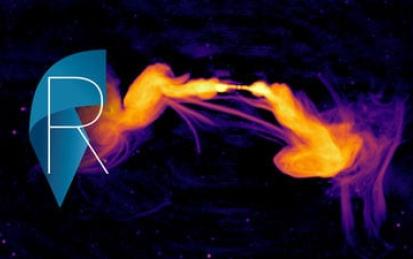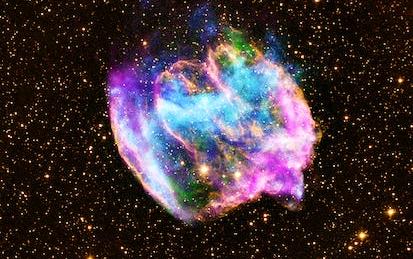

Our Courses

The Radio Sky II: Observational Radio Astronomy
This course covers the principles and practices of radio astronomical observations, in particular with modern interferometers. Topics range from radio telescope technology to the measurement equation to radio interferometric calibration and imaging.
-
Course by

-
 Self Paced
Self Paced
-
 English
English

Our Place in the Cosmos
Come aboard! If you decide to take this course, you will expand your horizon of what is possible for you in the cosmos. In Course 1 (Our Place in the Cosmos) of this four course specialization, there are 39 learning objectives spread out over 4 weeks and 10 lessons. Week 1 - You will learn about the course and the specialization as a whole as well as the method used to guide you through the material. You will also get to meet the crew of the USS Pathway to Space.
-
Course by

-
 Self Paced
Self Paced
-
 20 hours
20 hours
-
 English
English

Archaeoastronomy
Archaeoastronomy is the “science of stars and stones”. It is an interdisciplinary science in between architecture, archaeology, and astronomy. It studies the relationships between the ancient monuments and the sky, in order to gain a better understanding of the ideas of the architects of the past and of their religious and symbolic world.
-
Course by

-
 Self Paced
Self Paced
-
 7 hours
7 hours
-
 English
English

Imagining Other Earths
Are we alone? This course introduces core concepts in astronomy, biology, and planetary science that enable the student to speculate scientifically about this profound question and invent their own solar systems. All the features of this course are available for free. It does not offer a certificate upon completion.
-
Course by

-
 Self Paced
Self Paced
-
 26 hours
26 hours
-
 English
English

AstroTech: The Science and Technology behind Astronomical Discovery
"How do they know that?" Modern astronomy has made some astonishing discoveries - how stars burn and how black holes form; galaxies from the edge of the universe and killer rocks right next door; where the elements come from and how the expanding universe is accelerating. But how do we know all that? The truth is that astronomy would be impossible without technology, and every advance in astronomy is really an advance in technology. But the technology by itself is not enough.
-
Course by

-
 Self Paced
Self Paced
-
 6 hours
6 hours
-
 English
English

Julia Scientific Programming
This course introduces you to Julia as a first programming language. Julia is a high-level, high-performance dynamic programming language developed specifically for scientific computing. This language will be particularly useful for applications in physics, chemistry, astronomy, engineering, data science, bioinformatics, and many more.
-
Course by

-
 Self Paced
Self Paced
-
 19 hours
19 hours
-
 English
English

Knowing the Universe: History and Philosophy of Astronomy
This is an introductory level course about the history and philosophy of astronomy, the oldest science. We'll look at how humans learned to ask questions about the universe, and even before the invention of modern instruments like the telescope, learned some amazing things about their place in nature. We will start with prehistoric cultures who kept accurate calendars and move through the time of the Greek philosophers who laid down the rudiments of logic and mathematics and the modern scientific method.
-
Course by

-
 Self Paced
Self Paced
-
 32 hours
32 hours
-
 English
English

Astrobiology: Exploring Other Worlds
How are astronomers approaching their search for life in the universe? What have we learned from the surge of exoplanets discoveries? How likely is it that Earth does not host the only life in the Universe? In this course we explore the field of astrobiology, an emerging multidisciplinary field. Progress in astrobiology is driven by telescopes on the ground and in space, and by new insights on how life emerged on Earth and its diversity.
-
Course by

-
 Self Paced
Self Paced
-
 24 hours
24 hours
-
 English
English

Confronting The Big Questions: Highlights of Modern Astronomy
An introduction to modern astronomy's most important questions. The four sections of the course are Planets and Life in The Universe; The Life of Stars; Galaxies and Their Environments; The History of The Universe.
-
Course by

-
 Self Paced
Self Paced
-
 11 hours
11 hours
-
 English
English

The Evolving Universe
This is an introductory astronomy survey class that covers our understanding of the physical universe and its major constituents, including planetary systems, stars, galaxies, black holes, quasars, larger structures, and the universe as a whole.
-
Course by

-
 Self Paced
Self Paced
-
 66 hours
66 hours
-
 English
English

Data-driven Astronomy
Science is undergoing a data explosion, and astronomy is leading the way. Modern telescopes produce terabytes of data per observation, and the simulations required to model our observable Universe push supercomputers to their limits. To analyse this data scientists need to be able to think computationally to solve problems. In this course you will investigate the challenges of working with large datasets: how to implement algorithms that work; how to use databases to manage your data; and how to learn from your data with machine learning tools.
-
Course by

-
 Self Paced
Self Paced
-
 24 hours
24 hours
-
 English
English

Analyzing the Universe
Using publicly available data from NASA of actual satellite observations of astronomical x-ray sources, we explore some of the mysteries of the cosmos, including neutron stars, black holes, quasars and supernovae. We will analyze energy spectra and time series data to understand how these incredible objects work.
-
Course by

-
 Self Paced
Self Paced
-
 22 hours
22 hours
-
 English
English

Astronomy: Exploring Time and Space
This course is designed for anyone who is interested in learning more about modern astronomy. We will help you get up to date on the most recent astronomical discoveries while also providing support at an introductory level for those who have no background in science.
-
Course by

-
 Self Paced
Self Paced
-
 43 hours
43 hours
-
 English
English

Astro 101: Black Holes
What is a black hole? Do they really exist? How do they form? How are they related to stars? What would happen if you fell into one? How do you see a black hole if they emit no light? What’s the difference between a black hole and a really dark star? Could a particle accelerator create a black hole? Can a black hole also be a worm hole or a time machine? In Astro 101: Black Holes, you will explore the concepts behind black holes.
-
Course by

-
 Self Paced
Self Paced
-
 18 hours
18 hours
-
 English
English



